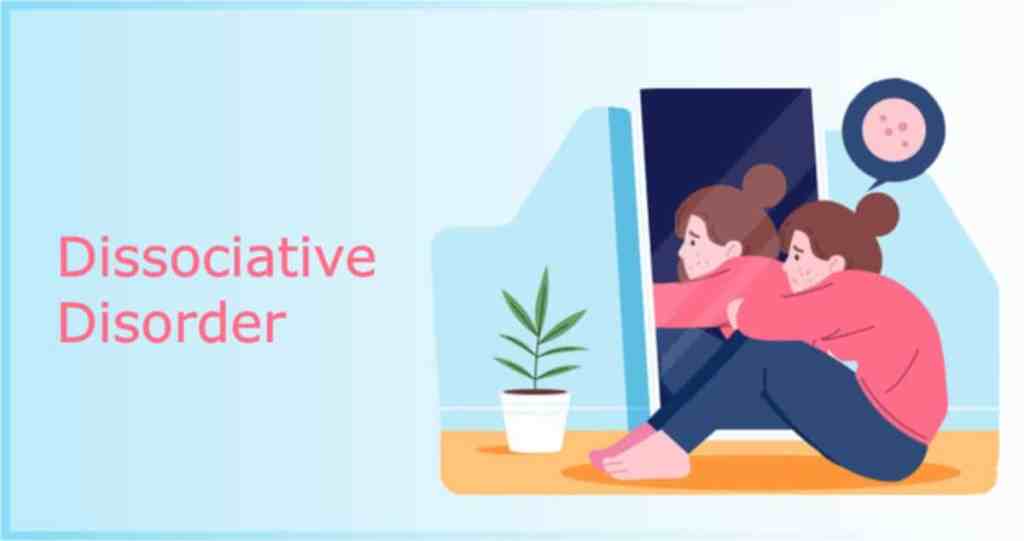Dissociative disorder is a group of mental illnesses that can cause serious disruptions in someone’s thoughts, feelings, or sense of identity. These conditions are usually the result of emotional trauma that causes an individual to dissociate from reality. There are many types of these disorders which range in severity and treatment method. In this blog post, we will explore the different types of dissociative disorders and how they affect people suffering from them.
Contents
- 1 What Are Dissociative Disorders?
- 1.1 Types Of Dissociative Disorder
- 1.2 Symptoms of These Disorders
- 1.3 Causes Dissociative Disorder
- 1.4 Risks Factors And Suicide Included In Dissociative Disorder
- 1.5 Diagnose For Dissociative Disorders
- 1.6 Treatment For Dissociative Disorder
- 1.7 What Are The Other Related Problems With Dissociative Disorder?
- 2 Conclusion
What Are Dissociative Disorders?

There are several different types of dissociative disorders, each with its own unique symptoms. The three most common types of dissociative disorders are Dissociative Identity Disorder (DID), Depersonalization Disorder (DP), and derealization disorder.
Types Of Dissociative Disorder
There are different types of dissociative disorder, the most common are:
Dissociative Identity Disorder
Dissociative Identity Disorder (previously known as Multiple Personality Disorder is a condition in which a person has more than one identity or personality. Each of these identities is usually unaware of the other identities, and each has its own unique name, age, gender, and set of characteristics.
People with DID may feel like they’re watching themselves from outside their body, or like they’re in a dream. They often have amnesia for events that occurred while another personality was in control.
Depersonalization Disorder
Depersonalization Disorder is a condition in which a person feels disconnected from their own body and mind. They may feel like they are watching themselves from outside their body, or that they are not really in control of their own actions. This can be very frightening and confusing.
Derealization Disorder
Derealization Disorder is a condition in which a person perceives the world around them as being unreal or dream-like. People with this disorder may describe objects as looking plastic or fake, or feeling like they are living in a movie or nightmare. This can be very frightening and confusing.
People with Derealization Disorder feel as though the world around them is not real. Everything may seem foggy, distorted, or dreamlike. This can be very scary and confusing for a person because they know that their surroundings are familiar to them but it doesn’t look or feel right at all.
Symptoms of These Disorders
Symptoms vary depending on which dissociative disorder a person has. In general, however, symptoms include:
- Amnesia (memory loss)
- Feeling numb inside
- Not feeling like yourself
- Dream-like feelings about life
- Feeling as though you’re in a daze
- Changes to your personality or identity
If you or a loved one is experiencing any of these symptoms, it’s important to seek professional help. A therapist can teach coping skills and talk therapy can help make sense out of what you’re going through and why your brain might be causing the changes in behavior that are having such a negative effect on your everyday life.
Causes Dissociative Disorder
There is no one cause for dissociative disorders, but there are a number of different factors that may lead to their development. These include:
- Traumatic experiences, such as abuse or neglect
- Having a family history of dissociative disorders
- Experiencing a great deal of stress in your life
- Having a mental illness, such as depression or anxiety
- Using drugs or alcohol
It’s important to remember that dissociative disorders are not caused by any one thing. They are the result of a combination of different factors, including trauma, stress, and genetics. This means that they can be treated with therapy and other interventions.
Risks Factors And Suicide Included In Dissociative Disorder
- People with dissociative disorders are at a higher risk for developing other mental health conditions, such as depression and anxiety. They also have a high rate of suicide attempts – between 38 to 64 percent will attempt suicide before or during treatment for this disorder.
- This is because they often feel like they are living in a world that is not real and this can be very isolating and overwhelming.
- In addition, people with dissociative disorders may have trouble coping with their emotions and may turn to drugs or alcohol as a way to self-medicate. All of these factors together increase the risk for suicide in people who suffer from a dissociative disorder.
There are a number of different risks factors that may increase your chances of developing the dissociative disorder. These include:
- Abuse at home
- Having a family history of the disorder
- Use of drug or alcohol use
- Having a mental illness, such as anxiety or depression
- Witnessing or experiencing a traumatic event
Diagnose For Dissociative Disorders

- Treatment for dissociative disorders generally involves some form of therapy. A therapist will help you understand why your brain is creating these feelings and behaviors and can teach coping skills that will make it easier to deal with the symptoms of this disorder on a day-to-day basis.
- Treatment for dissociative disorders includes psychotherapy (also known as “talk” therapy). Therapy teaches patients techniques like meditation and mindfulness which they can use to cope with their feelings when they arise instead of letting them take over completely. Antidepressant medications may also be used if necessary, but medication should always be prescribed after careful consultation with the patient.s therapist.
- In order to be diagnosed with any of these disorders, a person must have been experiencing symptoms for at least one month. This often makes it difficult for people who seem very different on the outside to understand what they are going through and why their life is so confusing.
- If you think that you might have a dissociative disorder, talk to your doctor about getting an evaluation from a mental health professional who specializes in this area.
- While there is no cure yet, treatment can help reduce many of the associated difficulties by helping individuals better cope with their feelings and emotions during episodes when they may experience more stressors than usual. Treatment also helps individuals gain a better understanding of their disorder and how it affects them.
Treatment For Dissociative Disorder
There are different types of treatment available, some of them are:
Psychotherapy Approach

- There is no one treatment that works for all people with dissociative disorders. However, psychotherapy (also known as “talk” therapy) can be a very helpful part of a person’s recovery from this disorder.
- During therapy, the therapist will work with you to create goals and boundaries that are specific to your needs so that they feel safe enough to talk about what they have been experiencing without being overwhelmed or flooded by their emotions.
- A good therapist also teaches people about the symptoms of a disorder and how it affects them. This helps people be more aware of when they might have an episode and what they can do to cope mentally instead of turning to drugs or alcohol, which could lead back into addiction problems.
- Psychotherapy is an effective approach to treating dissociative disorders and other mental health conditions.
- It involves talking with a therapist about your thoughts, feelings, and experiences in order to better understand them.
- This helps patients recognize that they are not alone in how they feel or what their life has been like up until now.
- Therapy also allows individuals suffering from these disorders to learn new coping skills so they can have more control over the way they react during stressful events instead of being taken over by their emotions completely.
Medicine Approach

- There is no one-size-fits-all approach to treating dissociative disorders. However, some people may find relief from their symptoms with medication.
- This could include antidepressants or antianxiety medications, which can help to stabilize a person’s mood and reduce the intensity of their dissociative episodes.
- If you are thinking about taking medicine for your disorder, it is important to talk with your doctor. The medicine might have side effects or be bad with other medicines.
- It is important to tell the doctor how well the medicine is working and if there are any side effects.
- Some medicine can be helpful for people with dissociative disorder. Some types of medicine are not recommended. Make sure to follow your doctor’s advice if you want to take any type of medication.
What Are The Other Related Problems With Dissociative Disorder?

Dissociative identity disorder (previously called multiple personality disorder) is the most well-known type of dissociative disorder. However, there are a number of other disorders that can be considered dissociative. These include:
Dissociative amnesia: This is when a person has trouble remembering important information about their life. They may not be able to remember things from days, weeks, or even years ago.
Psychogenic non-epileptic seizures (PNES): These are seizures that are not caused by changes in the brain. They are usually brought on by intense stress or emotional trauma.
Dissociative disorders can cause a number of other problems in a person’s life. These can include:
•Having trouble in maintaining Relationship
•Problem at doing work or attending school
• Start using drug and alcohol
• Problems with self-esteem or body image
It is important to get help if you are struggling with any of these issues. There is treatment available that can help you manage your disorder and improve your quality of life.
Conclusion
Dissociative disorders are both rare and complex. They involve disruptions in the normal functioning of identity, memory, or consciousness that can be caused by many factors. If you feel like any of these symptoms apply to you, please consult a medical professional for diagnosis and treatment options so you don’t suffer alone.
If you are looking for affordable Online Counseling MantraCare can help: Book a trial therapy session



